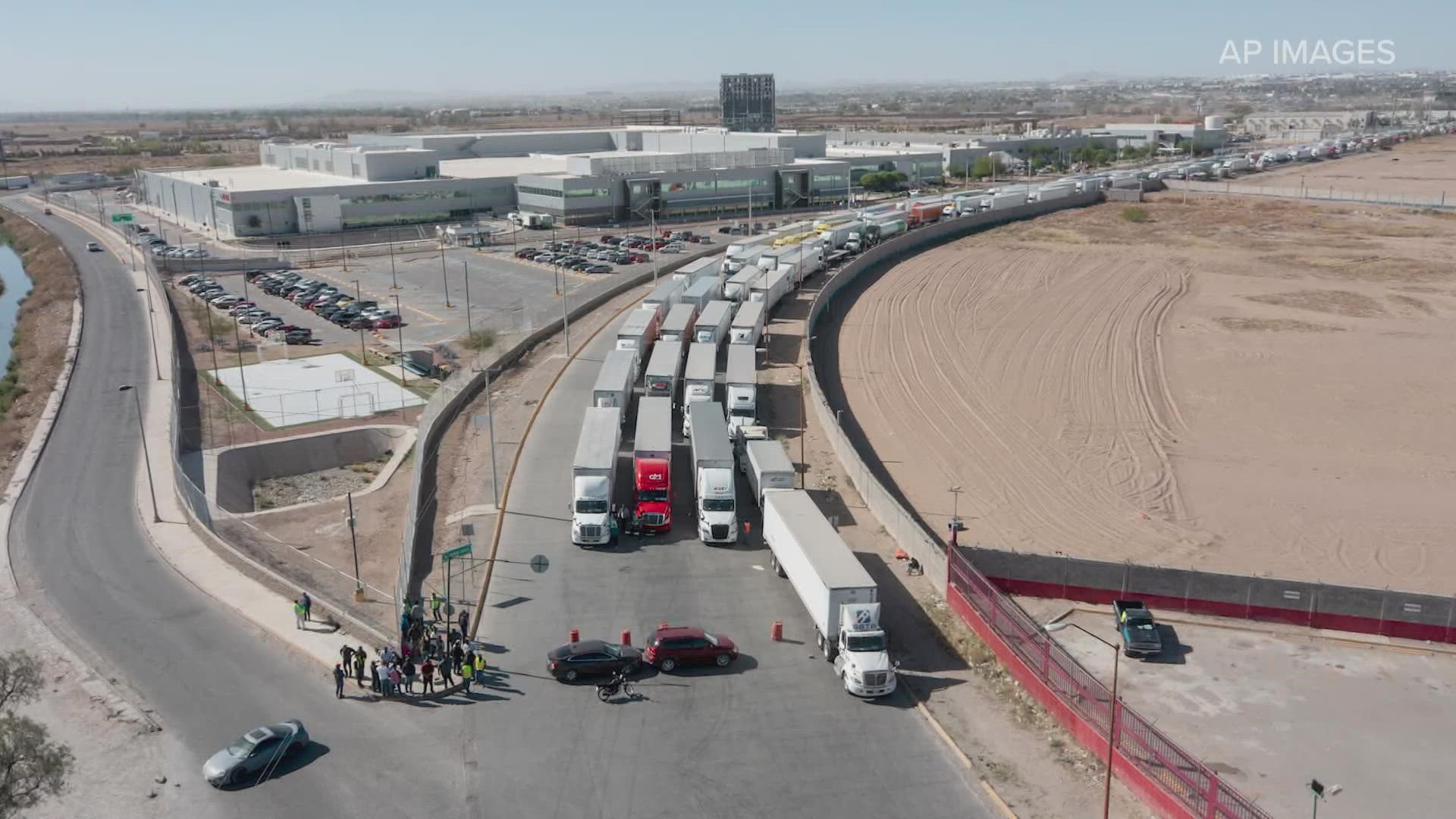DALLAS — Trucks crossing from Mexico into Texas are waiting 10 times longer than normal with delays moving from just minutes to hours and days.
Little Bear Produce in Edinburg has had some trucks waiting to cross since Monday. On Wednesday afternoon, its 15-loading docks were all empty.
“It was a very poorly made decision,” Bret Erickson, Little Bear’s senior vice president of business affairs, said. “It was a direct slap to businesses.”
Last week, Texas Governor Greg Abbott directed the Department of Public Safety to inspect every truck crossing into Texas from Mexico.
Erickson said, in a few days it’s cost the business hundreds of thousands of dollars and forced them to cut worker hours.
US Customs and Border Patrol says there’s been a 60% drop in commercial traffic at the border. Due to protests in Mexico over the backups, the Pharr Bridge was completely shut down Wednesday. On a typical day, it handles $70 million in goods.
“I knew immediately as soon as I heard about it it was going to be a huge wreck,” said Texas Agriculture Commissioner Sid Miller.
Miller, a Republican up for reelection, said Abbott never contacted him about the policy. Tuesday, he sent a letter to Gov. Abbott saying the policy would create a ‘catastrophe’ at the border.
“It’s going to cause empty shelves in the produce aisle,” Miller said in an interview Wednesday. “It was all a surprise to me and still haven’t heard back from him.”
Miller said this time of year, the United States is particularly reliant on Mexican produce, particularly melons and fruits and leafy greens.
“You don’t stop a crisis by implementing a second crisis,” he said.
In a press conference Wednesday, Abbott didn’t deny the inspections created delays. Instead, he said the delays were expected and would be used to get Mexican leaders to negotiate on border security.
Abbott said he would only stop inspections in Nuevo Leon, which handles one of 13 commercial crossings, after an agreement with its Governor to patrol its 9 miles of the 1,200-mile border. The signed agreement did not provide specifics on what that would entail or how success would be monitored.
Erickson and Miller believe the new checkpoint inspections do little to combat smuggling because DPS is doing safety checks for issues like engine problems, taillights or brakes, but is not looking inside of the trucks. US Customs and Border Patrol inspects the trucks and Erickson said Little Bear’s produce is further inspected by the FDA and USDA.
“This program does nothing to alleviate illegal immigration,” Miller said. “I don’t think he’s going to find anything. I don’t think it’s going to be anything that would secure the border.”
RELATED: First bus carrying Texas migrants arrives in D.C. full of men, women and children; more on the way
“Those dangerous vehicles with dangerous brakes could’ve run into a Texan walking across the road,” Abbott said at the press conference.
The Texas Trucking Association (TXTA) released a statement Wednesday saying, “this new initiative duplicates existing screening efforts and leads to significant congestion, delaying the products Americans rely on from our largest trading partner, Mexico. The current situation on the border simply cannot be sustained and we urge President Joe Biden and Governor Greg Abbott to come together before our economy endures further irreparable damage.”
There are few options for trucking companies. Erickson said they have tried to redirect drivers, but other companies are doing the same thing, which is creating further bottlenecks at other entry points. The other alternative is a 1,200-mile detour to enter through Arizona. Erickson and Miller said that route would drive business out of Texas.
“We’ve already got a shipping crisis on our hands and this just adds to it,” said Miller.
Little Bear Produce is still recovering from losing tens of millions of dollars on crops during the February freeze in 2021. Erickson said now, the product their product still on trucks will either rot or be returned to be sold in Mexico.
“It’s very frustrating and it’s a tough pill to swallow when we’re already battling this uphill slew of challenges,” he said. “It’s going to mean a poorer quality that goes to consumer and a higher price.”

